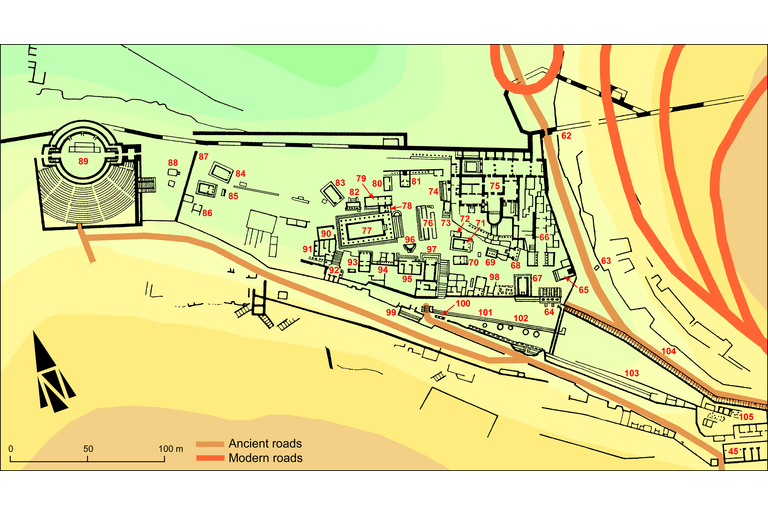Dedication to Apollo
IGCyr099700
Trismegistos ID: 738515
Source Description
Repository
Cyrene Museum, 182.
Support
Fragmentary white marble base with a projecting moulding above, broken on all sides except on top (0.095; 0.17;0.10).
Layout
Inscribed on front face in three lines at 0.032 under the moulding.
Letters
0.015; large dotted theta, nu slighlty shorter at right, open omega.
Place of Origin
Findspot.
Date
Fourth century B.C. (lettering)
Findspot
Found by C. Anti between 1925 and 1930 at Cyrene pleiades; HGL : Sanctuary of Apollo , East of the East staircase leading to the Fountain Terrace.
Later recorded Location
Seen by D. Morelli in 1960 in Shahat : Cyrene Museum .
Last recorded Location
Seen by C. Dobias-Lalou in 1979 at the same place.
Text constituted from
Transcription from stone (CDL).
Bibliography
Anti, Taccuini inediti Anti, C., Taccuini inediti - see in bibliography VII.28, whence SECir149 (no image) and again Morelli, SECir Oliverio, G., Pugliese-Carratelli, G., Morelli, D., 1961-1962, Supplemento Epigrafico Cirenaico, Annuario della Scuola Archeologica di Atene e delle Missioni Italiane in Oriente (ASAA)39-40 (= n.s. 23-24), 219-375 - see in bibliography , 254 (no image).
Apparatus
1
[- min.4 -] : SECir
Oliverio, G., Pugliese-Carratelli, G., Morelli, D., 1961-1962, Supplemento Epigrafico Cirenaico, Annuario della Scuola Archeologica di Atene e delle Missioni Italiane in Oriente (ASAA)39-40 (= n.s. 23-24), 219-375 - see in bibliography
[---]
2
SECir
Oliverio, G., Pugliese-Carratelli, G., Morelli, D., 1961-1962, Supplemento Epigrafico Cirenaico, Annuario della Scuola Archeologica di Atene e delle Missioni Italiane in Oriente (ASAA)39-40 (= n.s. 23-24), 219-375 - see in bibliography
[---] ἀνέθ[ηκε] : ἀνέθ[εν?] (also possible)
French translation
[Untel] fils de Dam [---] a consacré (ce monument) à Apollon.
English translation
[So-and-so] son of Dam [---] dedicated (this monument) to Apollo.
Italian translation
[Il tale] figlio di Dam [---] ha dedicato (questo monumento) ad Apollo.
Commentary
This inscription was published by Pugliese Carratelli in the second part of SECir from a drawing by Oliverio and a sketchbook of Anti. The latter worked at Cyrene from 1925 to 1930, whence the date given for the find. Morelli, staying at Cyrene together with Pugliese Carratelli in 1960, found the stone in the Cyrene Museum and by lack of coordination republished it from autopsy in the third part of SECir.
The adopted restorations are the shortest possible, supposing that only the name of Apollo stood at line 3. It is impossible to know whether at line 1 we have two first names, as at IGCyr099600, or one name with father's name, which is more usual. The adopted restoration and translation fits the latter case, whereas the alternative proposition would fit the first case. From the place of the end of the god's name, it appears that it should have stood in the middle of the line with blanks at both ends.
Creative Commons Attributions-NonCommercial 4.0 International License.
All citation, reuse or distribution of this work must contain a link back to DOI: http://doi.org/10.6092/UNIBO/IGCYRGVCYR and the filename (IGCyr000000 or GVCyr000), as well as the year of consultation.
